-
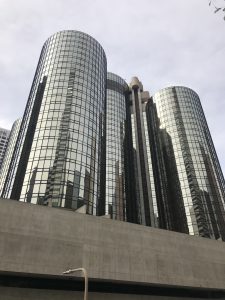
The Hotel Postmodernism
Her small grey head peaked out of the swell about twenty feet away from us. The curve of her back echoed the small waves rolling in through the slate-green Pacific off Venice Beach. In all the years I’ve been swimming in this little slice of ocean, down the street from where I lived in 1993-1994 right before grad school, I’d never had one of these creatures swim with me before. A selkie totem for #shax2018, the seal’s nearness startled us and calmed our shivering flesh. She swam between where we splashed into the water and where neoprene-armored surfers caught a few small waves. I lost sight of her after I body-surfed one little roller into shore. I don’t have a pic — I was phoneless in the water when we saw her — but that seal is my utopian totem for #shax2018. The benediction of nonhuman presence in the ocean!
- The last of four conversation topics in “The SAA, Shakespeare, and Us,” the seminar I co-lead with Carla Della Gatta, with incisive and generous respondant-ing by Erika Lin, asked the room for possible SAA-utopias. The floodgates of the wonder-world gushed forth: we sought communities of labor, changes in infrastructure and scale, “psychosocial mentoring” (which clarifying term Erika brought to us via Tracy Davis of Northwestern and ASTR) , recurrent seminars, more streamed or recorded sessions, “Half-assed Shakespeare,” the value of allowing ourselves to be wrong, “radical hospitality” (via Becky Fall and the Public Theatre, though I also thought of the glories of the BABEL Working Group), stewardship, service, public-facing events, “conflict is part of community” (paraphrased from Erika). What is “Shakespeare”? Who is “us”? What can and should the SAA become? So many good questions to keep asking!
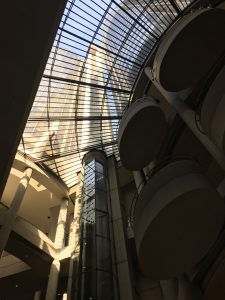
Inside the Bonaventure
- My core takeaways from the two hours traffic of our seminar swirled around support and especially mentorship, how it happens and what it could be. The topic came up again in the brilliant and necessary “Shakespeare beyond the Research University” session on Saturday, the second iteration of the “Shakespearean Futures” initiative that started with “The Color of Membership” last year in stormy Atlanta. I personally feel deeply fortunate to have been mentored by the SAA, both by many discrete individuals and more diffusely by the organization itself, since I started coming to the conference in the mid-1990s. Drafting this post Sat night as I wait to board a red-eye back to JFK while #shax2018 still dances, I’m abuzz with ideas to extend and support that process in the new & larger 21c SAA. We don’t need to start from zero: RSA and ASTR have ongoing mentorship programs, both among members (I have been in touch this year with two early career mentees via RSA) and at the conference itself (a student of mine was lucky to be matched with my co-seminar leader Carla Della Gatta at ASTR this past fall). We should formalize something, perhaps in time for #shax2019 in DC. #mentorhappyhour (with EANABs = “Equally Attractive Non-Alcoholic Beverages”)?
- Thursday afternoon’s NextGenPlen set the bar high for two reasons that I suspect are interwoven: the five early career speakers presented brilliant and innovative projects in queer theory, theater history, race theory, drag, and transgender rhetoric — and all five kept to time and dazzled the room with precise & powerful language. It made me think that ten minute talks are always better than twenty, because the short form prioritizes direct argument. It also made me eager to watch these young scholars develop their work and change our field!
- I suspect that few Native American languages have previously been spoken from the plenary stage at SAA. I found the Friday morning session with Scott Stevens, Lehua Yim, Terence Reilly, and James Lujan powerful and moving. The cultural and global dominance of Shakespeare represents, in a troubling way that the panel helped reveal, a global-cultural settler colonialism, in that the Bard goes everywhere and never leaves. There’s a lot of great scholarship on Global Shakespeares today — but I’d not encountered indigenous responses and approaches at the SAA before. During the panel I remembered my post-undergrad summer of 1989, when I was in Windy Bay, Alaska, laboring in the vain clean up of Exxon Valdez oil and sharing a fishing boat with perhaps two dozen members of an Athabascan community, mostly from English Bay. I’m embarrassed to say that I now can’t remember any of the tiny vocabulary I developed in Athabascan that summer.
- The first question we asked in our seminar was “What is Shakespeare?” And — importantly, I think — we supplemented that question with “Do we all have to agree about the answer?” The first question was hard to contain, but I think the answer to the second question must be no. Too much agreement is bad for conversation.
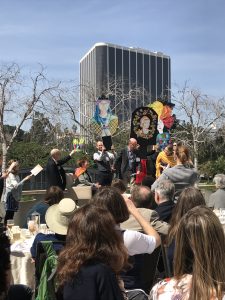
A substantial pageant
- Our seminar’s second major exchange took up another key word in our title: “Who is ‘us'”? We had lots to say again, and our discussion balanced honesty and generosity in ways that made me really happy. For me, I think the best possible answers to both “Shax” and “us” emerge from conscious and cultivated differences: we and our symbolic center must be many things, multitudinous things. It’s through allowing differences in all their discomfort, challenge, and surprise that we navigate our seminars, conferences, and oceans. I also recognize that myriad-mindedness has long been a canonical & perhaps even neoimperial cliche, effectively confining while purportedly open. Does it make sense to ask now for different and tangible differences, rather than just the same old infinite variety? That’s a project I’d like to continue exploring, and I hope the members of the seminar will continue to pursue it also.
- The 8 am ocean swim on Saturday morning kept me from the “End of Study,” alas, but my adventure with surfers, seal, and maritime companion Lowell Duckert drew me back to my early ’90s haunts in Venice Beach, from which locale I launched myself into graduate school and the professional life I’m living now. In some sense Venice in those days was my last stop before Shakespeare, the moment at which I found a fork in young adulthood and turned. I loved being back there, and I no doubt bored Lowell by showing him my favorite coffee shop (the Rose Cafe), my old apartment building on Westminster Ave, the sandy bike path on which I roller bladed and where musicians, artists, and hippies were setting up in the early morning mist. We ate breakfast at the Sidewalk Cafe, my old local, where I ate with my neighbors during the eerie dawn just after the Northridge MLK Day earthquake of 1994, which had jolted us out of bed. The electricity was out that morning but the gas stoves worked, so the Cafe made us all omelettes that we paid for later. We watched the sun come up behind the beach and hoped the ground would stop shaking. #anothermetaphor?
- What should the SAA become? I loved the “Lena Orlena” pageant and Wendy Wall’s multi-genred luncheon speech. No scholarly gathering makes me feel so at home and so eager to engage with people I don’t know yet as well as old friends and colleagues. “Beyond the Research University,” organized by Sharon O’Dair and Deborah Uman, seemed to me to get close to the heart of the matter. The diverse populations of SAA have much to learn from each other. Highlighting the worlds and labors of colleagues teaching at HBCUs, community colleges, and other non-elite places seems to me an essential step forward. Looking back now through the #shax2018 hashtag reveals outflows of generosity, curiosity, and playfulness. More of this, please! Excess of it!
-
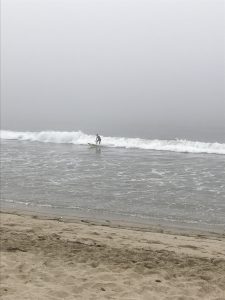
A surfer of Venice
My only moment of real discomfort all weekend, other than fatigue, came when I considered the symbolism of matching the roundtable on “Beyond the Research University” against a brilliant research panel on “Slavery, Service, and Fictions of Consent” in the Saturday 11 am slot. What does that choice represent for the SAA as a collective: must we choose between research and beyond-research? I have deep regard & affection for the leadership of SAA and recognize the challenge of too many sessions angling for finite time — but I believe it was a mistake not to make the Futures session, which spoke to the experience of the majority of the SAA membership, a Plenary with no competing sessions. For most of our near half-century as an organization, the SAA has imagined the R1 experience as at least aspirationally normative — but as much as I value humanities research, that’s an error we should have the honesty to stop making. One striking moment in the Roundtable called for the demolition of the “myth of academic meritocracy.” We need that demolition so much — and, if we could do it, or even begin to unravel that foundational myth of academia, it could lead, I believe, to better things, even in hard times.
- The Futures session was well-attended, including by the incoming Executive Director, though I was sorry that only a small fraction of the Trustees were there. I don’t mean to blame the people who were next door. I’d previously heard a snippet of one project on early modern slavery that was presented in that session, and I think it’s as brilliant as any new project I know in our field. But that’s why I think it was problematic to force that choice on the membership. A session on the careers that the majority of SAA members present and future live “beyond the research university” should not have to compete for its audience with the fruits of research. The SAA can, does, and should support both cutting-edge research and inquiry into state of our profession. We don’t need to put th0se conversations in competition with each other, even implicitly. Or at least that’s what I think.
- I’ll wrap up this overlong blog post with another story of nonhuman intervention. This second encounter will provide an alternative allegory for our gathering. As our pomo architectural sage Fredric Jameson didn’t say, #alwaysallegorize! This one erupted during the “Shax and Us” seminar, just before we opened the conversation to the full room of auditors. It wasn’t a seal in the surf but a cockroach on the table: I don’t know if the bug actually crawled out from beneath a pile of seminar papers, or if that image of reading as unearthing the hidden is just the way I like to imagine all seminars. Carla moved fast when she saw it, and I think she swept the roach onto the floor. I jumped out of my chair, but by the time I got to the other side of the long table the beastie had scuttled away & besides what would I have done with or to it?
-
One afternoon, as our conversation turned toward anxious visions of futurity, #shax2018 woke to discover that while we sat together around the table our collective conversation had been transformed into a monstrous bug.
- #shaxfutures #whatwillwebecome? #metamorphoses!
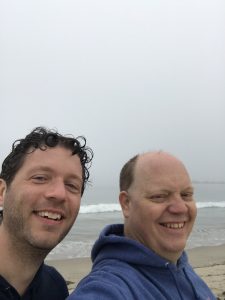
Post-immersion selfie
- It’s our task to love the nonhuman, to welcome interruptions, and to imagine capaciously in the face of challenges. Which creature best represents Shakespeare as settler colonialist and superlative poet? The graceful seal gliding through Pacific waves, or the impervious bug whose resilient carapace will outlast nuclear and ecological catastrophes? Which do we want our bald playwright hero to represent? #sealorbug?
- We know what the answer must be.
- Both seal and roach, utopia and dystopia. #forward!
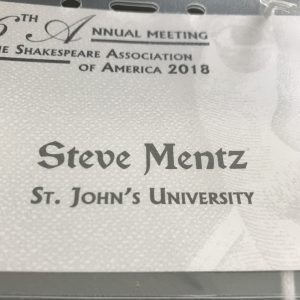 See everyone in DC!
See everyone in DC!